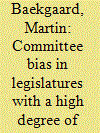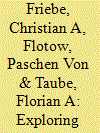| Srl | Item |
| 1 |
ID:
103358


|
|
|
|
|
| Publication |
2011.
|
| Summary/Abstract |
The institution of committees in democratic legislatures has for years been said to bias policy making because the preferences of committee members differ from, and are more alike than, those of other legislators due to self-selection to the committees. Based on an analysis of United States Senate committees, Hall and Grofman suggested in 1990 that the preferences of committee members primarily diverge from, and are more alike than, those of non-committee members on policy issues that are salient to constituencies or at least to an easily definable segment of constituencies. This article argues that the logic of Hall and Grofman should in fact be reversed in legislatures characterised by highly cohesive parties. Accordingly, the main hypothesis is that in such legislatures the preferences of committee members are more likely to be alike than those of non-committee members in the committees that work with policy issues of less salience to constituencies. Using a large-scale comparative design comprising data collected in 2008 on the spending preferences of 1,348 Danish local politicians, evidence is found supporting this hypothesis. This finding points to the importance of considering the role of parties when assessing committee bias.
|
|
|
|
|
|
|
|
|
|
|
|
|
|
|
|
| 2 |
ID:
132827


|
|
|
|
|
| Publication |
2014.
|
| Summary/Abstract |
This study challenges the implicit assumption of homogeneity in national institutional contexts made in past studies of (renewable) energy policy. We propose that institutional differences matter by focusing on several technology-specific and generic policy factors that can foster technology diffusion through private sector activity. More specifically, we explore perceptions of early adopters in emerging economy contexts using wind park project developers as an example. By applying a parsimonious method for our questionnaire as well as qualitative data we make several contributions: Methodologically, we introduce Maximum Difference Scaling to the energy policy domain. Empirically, we identify several public influences on private investment, and assess their relative importance. This leads to new insights challenging findings from industrialized economies; we identified additional institutional barriers to diffusion, hence, the requirement of a combination of technology-specific and generic policy measures.
|
|
|
|
|
|
|
|
|
|
|
|
|
|
|
|